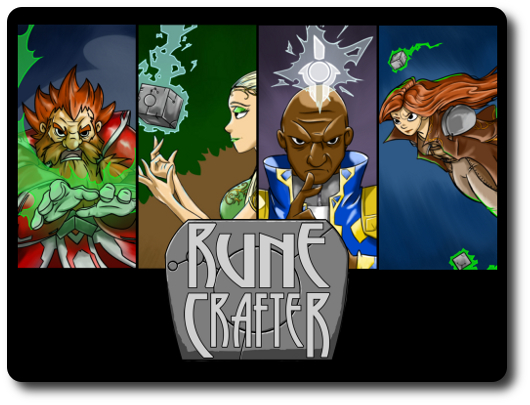
The Basics:
- For ages 7 and up (publisher suggests 8+)
- For 2 to 6 players
- Variable game play length
Geek Skills:
- Counting & Math
- Logical & Critical Decision Making
- Reading
- Pattern/Color Matching
- Risk vs. Reward
Learning Curve:
- Child – Easy
- Adult – Easy
Theme & Narrative:
- Battle other Rune Crafters to prove your magical might!
Endorsements:
- Gamer Geek rejected!
- Parent Geek mixed!
- Child Geek approved!
Overview
The art of crafting magical Runestones has been passed down in secret for generations. Each new student later becomes the teacher, showing the next generation how to craft the mystic runes. But the natural order of things has been disturbed. New powerful Runestones have been created and the balance of power has shifted. Now the Rune Crafters battle each other to control this new power. Some do so for prestige, while others are simply trying to survive.
Rune Crafter, designed by David North (I) and published by 5 Hit Combo Entertainment through The Game Crafter, is comprised of 6 Character Reference cards, 9 Event cards, 4 Special Runestone Reference cards, 1 red Healing Runestone custom six-sided die, 1 blue Resource Runestone custom six-sided die, 1 black Destroyer Runestone custom six-sided die, 1 purple Controller Runestone custom six-sided die, 5 green Regular Runestone custom six-sided dice, 1 standard four-sided die, and 12 small plastic rings. The cards are as durable as your standard playing card and the dice are slightly larger than your standard six-sided die. The illustrations, also by David North (I), capture the different Rune Crafter personalities fairly well, adding to the game’s theme and narrative.
Game Set Up
To set up the game, first have each player select 1 Character Reference card and take 2 plastic rings. The only difference between the Character Reference cards are the character portraits. No names are provided for the characters and all the stats are the same. Optionally, deal 1 Character Reference card to each player randomly.
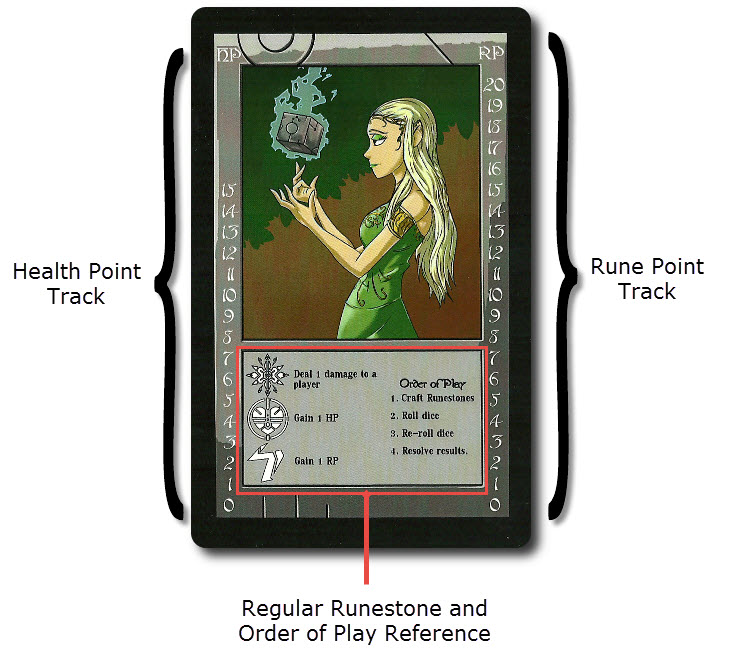
Second, have each player place 1 plastic ring over the “10” value on the Health Point (HP) track and place the other plastic ring over the “0” value on the Rune Point (RP) track.
Third, shuffle the Event deck and place it face-down to one side of the game playing area, making sure to leave room for a discard pile. This is the Event draw deck for the duration of the game.
Fourth, place the Special Runestone Reference cards, face-up, next to the Event draw deck. Place the matching colored Runestone on the box outline found on each Special Runestone Reference card.
That’s it for game set up. Determine who should go fist and pass the first player the 5 Regular Runestone dice.
Throwing Runestones
Rune Crafter is played in rounds and turns with no set number of rounds per game. A player’s turn is broken down into several steps which are summarized here.
Step 0: Draw One Event Card (Conditional)
If this is the first round of the game, skip this step. During the second and all later rounds, a new Event card is drawn, read out lout, and remains active for the duration of the round. In game terms, an Event card alters what the players can and cannot do during the round. Negative and positive effects can be drawn which can tip the balance of power in and out of a player’s favor. Thematically, the events are portraying the results of tampering with magical forces the player’s shouldn’t be messing with.
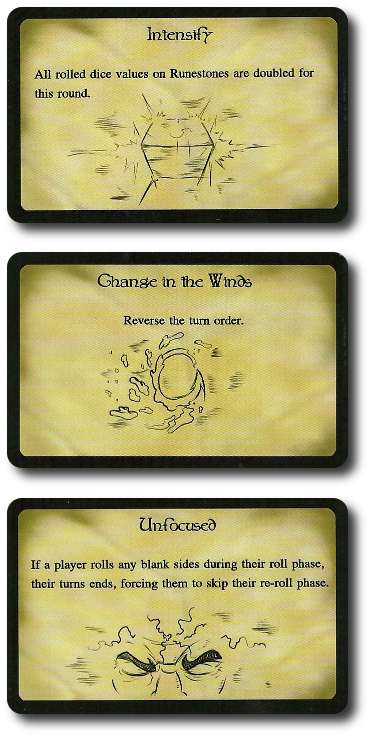
When new rounds begin, the Event card from the previous round is discarded. When the Event draw deck is exhausted, shuffle the Event discard pile to create a new Event draw deck.
Step 1: Craft One Runestone (Optional)
At the start of the game, each player has zero Rune Points to spend. As the game progresses, they will roll more Rune Points and eventually have enough to purchase any available Special Runestones. A player can only purchase 1 Special Runestone die per turn, but there is no limit to the number of Special Runestones they can acquire. Unlike the Regular Runestones that are shared among the players, the player who purchases a Special Runestone is the only one who can use it until they lose it.
When purchasing a Special Runestone, the player subtracts the cost of the Special Runestone from their Rune Point track. A player must be able to pay for the Special Runestone’s full value. If they can, they take the die and the matching Special Runestone Reference card. The newly crafted Runestone can be used (and targeted) immediately.
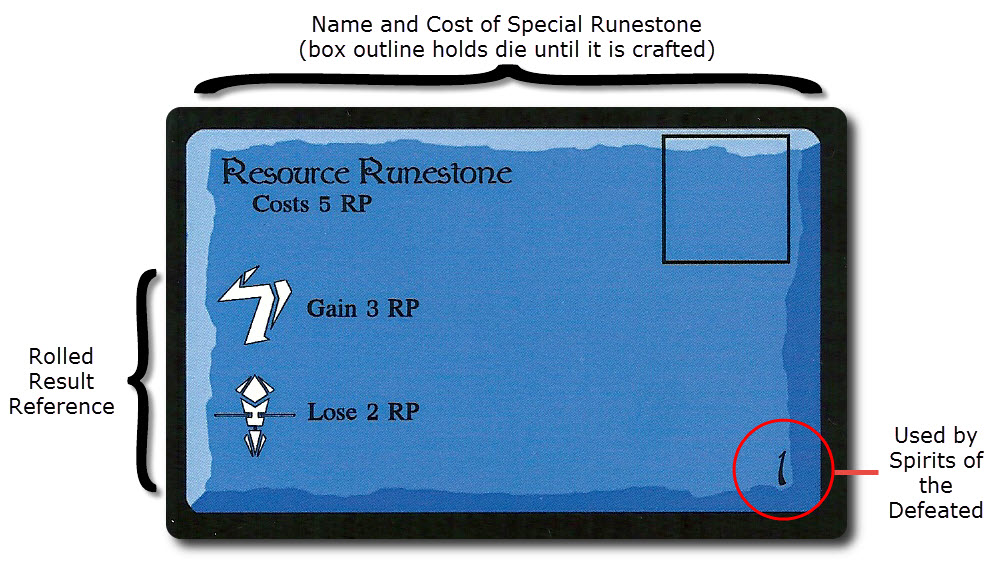
Players should be cautious about using the Special Runestones. While they are unique and provide special effects the Regular Runestones do not, they are also unpredictable and cause as much harm as good. Each of the Special Runestones are summarized here:
- Healing Runestone: gives the player 2 Health Points or penalizes the player by reducing their Health Points by -2.
- Resource Runestone: gives the player 2 Rune Points or penalizes the player by reducing their Rune Points by -2.
- Controller Runestone: gives the player the ability to re-roll 1 Runestone die, force all players to lose any crafted Special Runestones, or lose 2 Health Points.
- Destroyer Runestone: gives the player the ability to reduce an opponent’s Health Points by -4, select 1 Special Runestone in play and destroy it, or lose 5 Health Points.
There is a BIG difference between players losing possession of a Runestone and having a Runestone destroyed. If a player loses possession of a Runestone, the Special Runestone die and its matching Special Runestone Reference card are placed back next to the Event draw deck. If the Runestone is destroyed, the player loses the Special Runestone as just described and reduces their Health Points by -5.
Step 2: Roll Runestones (Required)
The player now rolls all 5 of the green Regular Runestone dice. If the player has any Special Runestone dice, they can choose to roll them, as well. After the first roll, the player can set aside any rolled values they like and re-roll the other dice or they can stop rolling and resolve the dice values. If the player does re-roll, they MUST roll any Special Runestones they have crafted. After this second roll, all the dice values are locked and resolved.
Unlike the Special Runestones, the Regular Runestones are always beneficial to the player who rolls them, but they can also fail to provide any benefit whatsoever. The possible effects of a Regular Runestone are listed on the Character Reference card and are summarized here.
- Reduce an opponent’s Health Points by -1
- Gain +1 Health Points
- Gain +1 Rune Points
A player can never have any more than 15 Health Points or 20 Rune Points in the game.
After all the dice have been resolved, the player keeps any Special Runestones dice they might have and passes the 5 Regular Runestone dice to the next player in turn order sequence. This completes the player’s turn.
Character Demise and Winning the Game
When a character’s Health Points are reduced to zero or less, the have fallen. The player with the fallen character returns any Special Runestone dice they have in their possession. Then the player flips their Character Reference card over and becomes a Spirit of the Defeated, a supernatural entity made of the same magical essence as the Runestones.
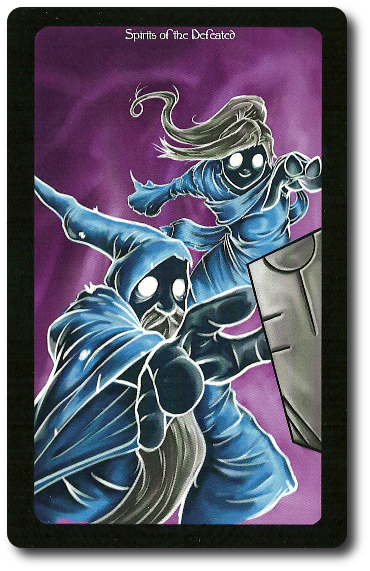
On the player’s future turns, they will roll the four-sided die, which is referred to as the Death die. The player will no longer be rolling any Runestone dice. On a rolled result of “4”, the player will roll the Death die again. This time the rolled value will be used to determine which Special Runestone will be destroyed. Each of the Special Runestone Reference cards has a number value. This number value is matched to the rolled number value on the Death die. If a player has control of the matching Special Runestone, they reduce their Health Points by -5 and lose the Special Runestone.
The game continues with players taking turns and starting new rounds. When only one player remains that is not a Spirit of the Defeated, the game comes to an end and they are declared the winner.
To learn more about Rune Crafter, visit the game’s web page on The Game Crafter.
Final Word
The Child Geeks loved rolling dice and taking out their opponents. As one Child Geek said, “The best part of this game is that I feel like I’m messing with powerful and dangerous magic. It feels great when you do damage to your opponents instead of yourself!” The chance of failure and suffering self-inflicted damage made every roll for the Child Geeks feel tense and ended in cheers, groans, or shrugs of indifference when the dice were resolved. One Child Geek said, “It’s hard sometimes to determine what you should focus on. Most of the time, I just keep my life up and get Rune Points when I can.” With the largest number of players possible (6 in total) the game dragged, but became faster as more and more players became Spirits of the Departed. One such Spirit said, “When you are out of the game, it kind of stinks, but it’s not that bad. You can really mess with other players!” All the Child Geeks enjoyed their time with Rune Crafter and voted to approve it.
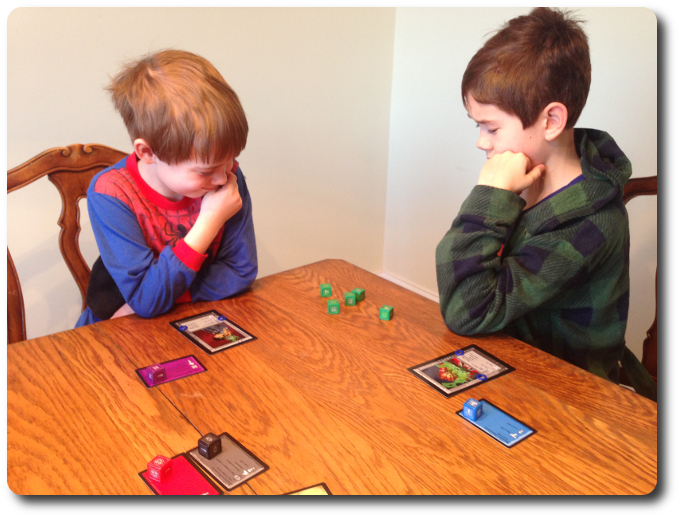
My oldest debates the pros and cons of re-rolling, while his younger brother provides less than helpful advice
The Parent Geeks most certainly enjoyed playing Rune Crafter with their family and mixed groups of Child and Parent Geeks, but didn’t get all that excited when they played the game with just their peers. One Parent Geek said, “This is an easy game to learn and can be fast to play, depending on how the dice roll, but it just feels way too repetitive. The game falls a bit flat for me.” Another Parent Geek said, “This is a great game for my kids and one I enjoy playing with them, but I want something with more depth when I play with adults.” The Parent Geeks enjoyed the risk versus reward critical thinking in the game, but never felt that the choices were all that complex. Perfect for younger minds learning games, but for the adults, the game’s level of challenge came down to tolerating luck and randomness. The Parent Geeks were undecided with their vote, approving the game for their families, but not particularly caring for it with their friends.
The Gamer Geeks did not care for this game. As one Gamer Geek said, “The only choice you have in this game is to participate or not. I chose poorly.” Another Gamer Geek said, “Games like this are great for people who just want to play a game by going through the motions without thinking about it. Makes for an easy game to play in a social situation, but it’s not much of a game.” All the Gamer Geeks liked the idea of crafting new Runestones, but didn’t like how easy they were to take away. As one Gamer Geek said in frustration, “I mean, why bother? They are too risky and take too much time to focus on, only to be lost or targeted.” The Gamer Geeks also didn’t care for how hollow the game felt. One fed up Gamer Geek said, “The game’s theme has been done, the risk taking is old news, and the choices are this or that without really making much of a difference. This is not a good game.” As for the Spirits of the Defeated, the Gamer Geeks liked that their single purpose was to make the game end faster. When it came time to vote, the Gamer Geeks gave Rune Crafter the boot, agreeing to never play it again.
I am always having the same philosophical discussion with my play groups. We debate ad nauseam what makes something a “good” or a “bad” game. I have convinced pretty much everyone that the right answer is the one the individual decides, but their answer is highly subjective. It’s like me saying burgers are the best thing in the world to a vegetarian. My statement is true as it pertains to my temperament, but is way off the mark for the vegetarian who now thinks I’m an animal murderer. When it comes to games (and burgers), whose statements are more accurate? Who’s right and who’s wrong?
The answer is based on your personal point-of-view. Which means there is no answer except the one you decide to believe. Which might be your own or another person’s opinion you adopt as your own. Deep, eh?
Rune Crafter is a dice game, plain and simple. Elements of luck, risk taking, and random outcomes are at its base, but players can also make choices. For example, which opponent to attack and which Special Runestone dice to craft. Depending on a player’s personal preference, that’s a whole lot of goodness or bowl full of slop. Since my job is to just observe and report, I do all I can to keep my mouth shut so as not to influence the end results. I’m afraid I still do a lot of eye-rolling, however, whenever I hear a player declare a game’s value using a tone of superiority when all they are doing is expressing their personal opinion. Even more so when they then try to argue and defend their opinion as if it’s a scientific fact backed by thousands of studies and unquestionable data.
So here’s mine, which is admittedly highly hypocritical, but is based completely on my own thoughts.
Personally, I think Rune Crafter is a great game for Child Geeks and a fun one for me to play with them. I’m not big on games like Rune Crafter in general, but I’ll be damned if I miss a chance to play a game with my kids. Sometimes that means I get to enjoy a game that is not one I would normally want to play and sometimes that means I do. While Rune Crafter is not a game I would reach for when playing with Gamer Geeks, it certainly does its job and does it well when I’m playing with Parent and Child Geeks at the same table. If you are looking for a game where taking risk could lead to a reward or a dangerous dice explosions, do sit down and play a game of Rune Crafter.
This game was given to Father Geek as a review copy. Father Geek was not paid, bribed, wined, dined, or threatened in vain hopes of influencing this review. Such is the statuesque and legendary integrity of Father Geek.



